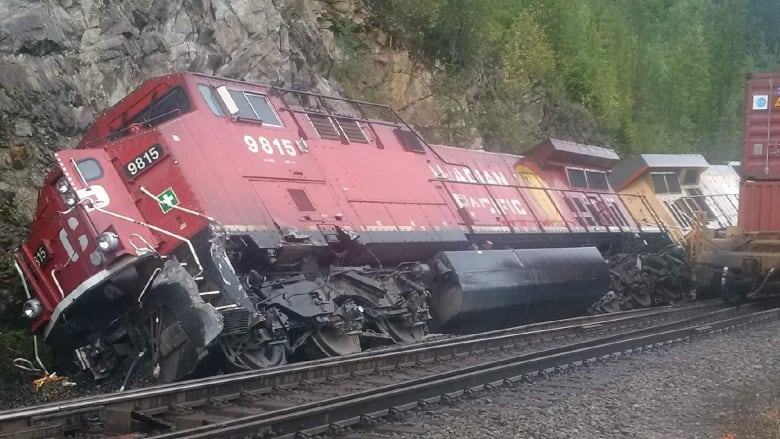TSB finds train crash near Rogers Pass caused by communication breakdown
Oncoming train was not aware the other was over length, report finds

The Transportation Safety Board has found that a Canadian Pacific train collision and derailment near B.C.'s Rogers Pass in the summer of 2015 was caused by a lack of communication and a failure to follow signals.
The collision happened in the early morning hours of Sunday, Sept. 6, 2015, at Beavermouth, east of Rogers Pass between Revelstoke and Golden.
A westbound CP train had parked on a siding track to allow an eastbound train to pass, but the westbound train was over length, meaning it was too long to fit completely, leaving several cars sticking out onto the main track.
Eastbound trained ignored signals
In its full report on the incident, the TSB found that the crew of the eastbound train did not know the westbound train was over length, and ignored several signals advising them to be prepared to stop ahead.
As a result, the approximately 4,500-tonne, 2.4-kilometre-long eastbound train rounded the corner before the siding track at about 35 km/h, only to see the westbound train's tail end still on the main track.
The eastbound train applied its emergency brakes, but it was too late the eastbound train collided with the parked train. Its two lead locomotives and an empty hopper car ended up in the ditch, resting against an adjacent rock wall. One of the westbound train's cars was derailed as well.
The conductor of the eastbound train suffered a concussion after being thrown from his seat, but the engineer at the controls was unharmed.
Track work caused radio chatter
According to the report, the section of track where the collision occurred was undergoing repair work at the time. Numerous discussions about construction zone details were taking place with CP's central traffic control over the radio, which may have lead to some of the confusion and lack of communication.
Over length trains are not uncommon. According to the report, one to two trains a day travel through that particular stretch of track over length.
But in this case, the extra radio chatter meant the eastbound train was never informed that the train it was about to pass was over length and there is in fact no requirement for the rail traffic controller to do so.
The report acknowledges that the geography of the area and the double-stacked cars of the westbound train meant the oncoming train couldn't see the problem until they were already upon it.
But the report says it was a clear night, and the crew should have been able to clearly see the signals advising them a stop would be required ahead.
Signal failsafes needed
The report does not make any specific recommendations to prevent such accidents in the future. However, it highlights the fact that a lack of accurate information left the crew of the eastbound train with an "inaccurate mental model" of the situation, which increased the risk of a collision.
It also suggests that signaling systems be equipped with failsafes to prevent similar situations.
"If existing signal systems are not enhanced to include physical failsafe capabilities, failures to follow signal indications will continue, and the risk of train collisions and derailments will persist," the report reads.












_(720p).jpg)


 OFFICIAL HD MUSIC VIDEO.jpg)
.jpg)



























































































